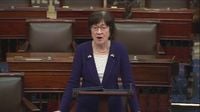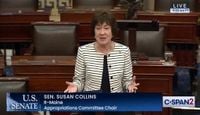In a surprising turn of events, the Senate voted 51-48 on April 2, 2025, to pass a resolution that blocks President Donald Trump’s plan to impose tariffs on Canadian imports. This action marks a rare bipartisan rebuke to the president, as four Republican senators joined all Democrats in supporting the measure. The resolution, spearheaded by Senator Tim Kaine of Virginia, aims to end Trump’s emergency declaration regarding fentanyl trafficking, which he has used to justify the proposed tariffs.
Earlier that day, Trump had announced a sweeping set of tariffs during what he called "Liberation Day" in a Rose Garden address. The tariffs, which include a 25% tax on foreign-made automobiles, are part of Trump's broader strategy to reshape trade policies and boost U.S. manufacturing. However, the Senate's resolution signals a significant fracture within the Republican Party, as some members express growing concern over the potential economic repercussions of such tariffs.
Senator Susan Collins of Maine, one of the four Republicans who voted for the resolution, delivered a passionate speech on the Senate floor. She described the tariffs as "harmful and unjustified," warning that they would negatively impact Maine’s economy, which is heavily integrated with Canada. "From home heating oil to gasoline, jet fuel, and other refined petroleum products, the tariffs on Canada would be detrimental to many Maine families and our local economies," Collins stated.
Collins highlighted that Canada is Maine's largest trading partner, supplying 80% of the state’s gasoline and heating fuel. She emphasized that the tariffs would lead to price hikes for essential goods, making it difficult for families to make ends meet. "The price hikes that will happen for Maine families, every time they go to the grocery store, they fill their gas tank, they fill their heating oil tank, if these tariffs go into effect, will be so harmful," she said.
Despite Trump’s claims that Canada is not doing enough to stop fentanyl trafficking, federal data tells a different story. According to the U.S. Customs and Border Protection, only 43 pounds of fentanyl were seized at the northern border in the 2024 fiscal year, with less than 1.5 pounds seized since January 2025. In contrast, over 21,000 pounds were seized at the southern border during the same period. Collins argued that the vast majority of fentanyl in America comes from the southern border, not Canada.
Trump's tariffs have drawn criticism not only from Democrats but also from within his party. Senate Minority Leader Mitch McConnell, who also voted for the resolution, warned that the tariffs could have long-term consequences for industries in Kentucky, where bourbon distillers are already grappling with retaliatory tariffs from Canada. "Tariffs make it more expensive to do business in America, driving up costs for producers and consumers across the board," McConnell stated.
Senator Rand Paul of Kentucky echoed similar sentiments, arguing against giving the president unilateral authority to impose taxes on imports. "Every dollar collected in tariff revenue comes straight out of the pockets of American consumers," Paul said. He emphasized that conservatives used to uniformly oppose raising taxes, noting that tariffs are essentially taxes on the American people.
As the Senate passed the resolution, Trump took to Truth Social to criticize Collins and the other Republican senators who defied him. He called on them to "get on the Republican bandwagon, for a change," and accused them of being "unbelievably disloyal" to the party. Trump claimed that the Senate bill was a ploy by Democrats to expose the weakness of certain Republicans.
The resolution's passage does not guarantee that it will become law, as it faces an uncertain future in the Republican-controlled House of Representatives. Even if it were to pass there, it is likely that Trump would veto it. However, the Senate vote reflects a growing unease among Republicans regarding Trump's aggressive trade policies.
In the wake of the Senate's decision, Collins reiterated her commitment to supporting the resolution, stating, "If these tariffs go into effect, it will be so harmful, and as price hikes always do, they will hurt those the most who can afford them the least." She cited the potential negative impact on various Maine industries, including paper mills, lobstermen, blueberry growers, and potato farmers.
Collins’ position is echoed by other members of Maine's congressional delegation. Independent Senator Angus King expressed concern about the economic consequences of a trade war with Canada, stating that it would harm many key industries in the state. King highlighted that Maine exports more than $1.8 billion in goods to Canada annually, underscoring the importance of maintaining strong trade relations.
As the debate over tariffs continues, the implications for American families and the economy remain a focal point. Democratic representatives have also voiced their opposition to the tariffs, arguing that they will exacerbate the financial burdens already faced by many households. Representative Chellie Pingree stated, "The sweeping tariffs will not ease the burden for American families who are already struggling with the high cost of living."
In contrast, some Democrats, like Representative Jared Golden, have shown support for Trump’s tariff strategy, calling for further policy reforms to ensure that tariffs benefit American families and prioritize their prosperity. Golden emphasized the need to renegotiate trade deals and support domestic manufacturers.
As the situation develops, both parties will need to navigate the complex landscape of trade policies and their ramifications for American families and businesses. With the Senate resolution serving as a clear indication of the growing dissent among Republicans, it remains to be seen how Trump will respond and what the future holds for U.S.-Canada trade relations.









